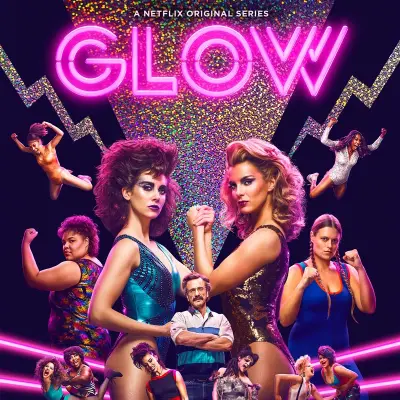GLOW's cancelation sucks, not just because the Netflix dramedy won't get to end as it planned
-

"It sucks because, in addition to focusing on women’s stories, GLOW also put women at the forefront behind the camera," says Jen Chaney. "Its showrunners were women. In each season, more than half of its directors were women, including the late, gifted Lynn Shelton, who died suddenly earlier this year of a previously undiagnosed blood disorder. The writing credits on the vast majority of episodes also belonged to women. The ensemble cast included women of different races, ethnicities, and, significantly, sizes, a testament to the fact that any woman can be powerful in spandex. Because of the ridiculous theater that typified the original 'Gorgeous Ladies of Wrestling' during that era, some of the characters were often saddled with gross stereotypes. Season two’s 'Mother of All Matches' confronted that issue directly by placing Tammé (Kia Stevens) — wrestling name: Welfare Queen — in a pivotal match against Liberty Belle (Betty Gilpin), a.k.a. Debbie, that Tammé’s son comes to watch. The fact that Debbie mocks Welfare Queen, who is Black, for being poor and having too many kids hits Tammé as blatantly unfunny with her son, a Stanford student, watching. After the mostly white people in the audience start shouting at her to get a job, she suddenly starts crying and exits the ring. It’s a heartbreaking thing to witness. GLOW did this kind of thing regularly: placed us in the ’80s as some may remember it, with its high energy, gravity-defying hair, and shameless jokes, then revealed how insensitive, crass, and alienating it often was. The fact that the show was able to walk that line between silly camp and sincere social commentary was one of GLOW’s greatest feats. It took its characters and underlying themes seriously, but never took itself too seriously. At times it reveled in the fun of its era, filling its soundtrack with upbeat songs by everyone from Starship to Siouxsie and the Banshees to Scandal. It was really entertaining. But it also had depth, and it packed all of those elements into episodes that only lasted 30 minutes."
ALSO:
- Female-led shows always seem to get the short end of the stick at Netflix: "Perhaps the greatest irony in all of this is that GLOW has long been the kind of show that Netflix’s business model was supposed to support better than traditional networks—shows that, despite their sterling reputations, never quite manage to bring in the viewership linear networks count on to stay afloat," says Laura Bradley. "GLOW was never going to have broad, tentpole appeal. It’s a weird show about weird women wrestling, all managed by a puppyish producer and a jaded slasher director. The show’s perspective and especially its humor—with chestnuts like “There’s one ball you can’t castrate; that’s the mind”—have always been a beautiful blend of crassness and ultra-sequinned femininity. It was never a show for everyone, but for the someones it was for, GLOW hit a wonderful, rare sweet spot. And in lieu of a massive audience, GLOW was among the series that lended Netflix some prestige. Although the show never brought in the viral viewership of more popular programs like Stranger Things, it brought home nominations each year for cast and crew, and won in categories including stunt coordination and production design. Still, being adored by critics has never been enough to save shows from the increasingly cruel Netflix axe—especially if a show happens to be female-led; just ask One Day at a Time and Tuca & Bertie, both of which have found homes on other networks after Netflix cut them."
- GLOW's cancelation is a "tragedy": "Netflix claims GLOW was cancelled due to financial concerns, which is a real laugh in the year of big-budget dreck like Space Force, Altered Carbon, and Ratched," says Darren Franich. "(Friday brings The Haunting of Bly Manor, a horror anthology set in the cosplay '80s with one of the most boring season premieres I've ever seen.) Maybe GLOW just didn't fill any obvious niche for the streaming service anymore. (Betty) Gilpin earned Emmy nominations for her breakout performance, but the show was too weird to ever be an awards darling. It was very funny without ever being the sort of quippy banter-fest that gets all the attention lately. I called it 'feminist' back in paragraph one, yet there was a tricky not-quite-triumphalist approach to its characters' empowerment. They loved working together, and didn't know if their fans loved them for the right reasons. Ruth practically got sexually assaulted by the network president — and Debbie flat-out suggested she should have given in for the cause. These women were modest nobodies grasping for Z-level stardom, not quite the predominant world-conquering tone in a Mrs. America year. Was GLOW too silly for the serious audience and too serious for the silly audience? Executive producer Jenji Kohan actually lost two Netflix projects on Monday, since the service declined to renew her Teenage Bounty Hunters. (Tough market for anyone not producing a megabudget space opera, I guess.)"
- Alison Brie, Marc Maron, Shakira Barrera and more cast members say goodbye to GLOW
TOPICS: GLOW, Netflix, Alison Brie, Marc Maron
More GLOW on Primetimer:
